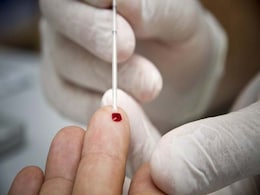Oral Herpes
- All
- News
-

6 Things You Should Know About Sexually Transmitted Diseases
- Wednesday December 27, 2017
- DoctorNDTV
Sexual contact may make you develop dangerous sexually transmitted diseases like HIV, genital herpes, Syphilis, gonorrhoea etc. But do you think you know all you need to know about STDs? Here are 6 things you should know about Sexually transmitted diseases.
-
 doctor.ndtv.com
doctor.ndtv.com
-

You Probably Have Herpes, But That's Really Okay
- Tuesday November 3, 2015
- Health | Rachel Feltman, The Washington Post
According to a recent report by the World Health Organization, 2 out of 3 people under the age of 50 have Herpes Simplex Virus 1 (HSV-1), more commonly known as oral herpes. That's a staggering 3.7 billion people with a (currently) incurable virus.
-
 www.ndtv.com
www.ndtv.com
-
Oral contraceptives increase herpes shedding
- Wednesday May 18, 2005
- Team DoctorNDTV
Consuming oral contraceptives can double the risk of active shedding of the herpes virus in women suffering from genital herpes, hence passing on the infection.
-
 doctor.ndtv.com
doctor.ndtv.com
-

6 Things You Should Know About Sexually Transmitted Diseases
- Wednesday December 27, 2017
- DoctorNDTV
Sexual contact may make you develop dangerous sexually transmitted diseases like HIV, genital herpes, Syphilis, gonorrhoea etc. But do you think you know all you need to know about STDs? Here are 6 things you should know about Sexually transmitted diseases.
-
 doctor.ndtv.com
doctor.ndtv.com
-

You Probably Have Herpes, But That's Really Okay
- Tuesday November 3, 2015
- Health | Rachel Feltman, The Washington Post
According to a recent report by the World Health Organization, 2 out of 3 people under the age of 50 have Herpes Simplex Virus 1 (HSV-1), more commonly known as oral herpes. That's a staggering 3.7 billion people with a (currently) incurable virus.
-
 www.ndtv.com
www.ndtv.com
-
Oral contraceptives increase herpes shedding
- Wednesday May 18, 2005
- Team DoctorNDTV
Consuming oral contraceptives can double the risk of active shedding of the herpes virus in women suffering from genital herpes, hence passing on the infection.
-
 doctor.ndtv.com
doctor.ndtv.com




